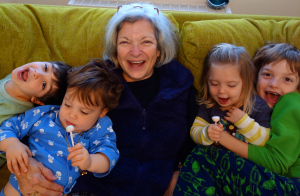My mother recently came to visit me and my family for ten days. Here is a list of the things she did vis-a-vis my four children:
Played with them, if asked.
Gave them snacks and sweets.
Talked to them.
Bought them gifts.
Hugged and kissed them.
And here is a list of the things she didn’t do:
Bathe them.
Dress them.
Prepare or serve any of their meals.
Help them with their homework.
Put them to bed.
Based on these lists, my mom is what you might call a “hands-off” Grandma—or Bubbe, as she is affectionately referred to. She loves her grandkids. She enjoys spending time with them, in small doses. She cares about their well-being and what is happening in their lives. But she is not interested in participating in the grunt work of raising them: the tasks that include bodily fluids and flailing limbs, tears and stall tactics and four outfit changes in as many minutes. In so far as it is possible to engineer, my mother, at 70, is looking to experience the good bits associated with young children, the fun bits, and not the slog.
For her, this is the line between what it is to be a grandparent and what it is to be a parent. This is the privilege you earn with the prefix “Grand.” “I’ve done my time,” she says, and she certainly has. She is the mother of three children, across eight years and two marriages. She did everything for us as we grew up—playdates, parties, projects—everything. She watches some of her friends “grandparent” in a way she finds unappealing, women, she says, who are attempting motherhood all over again. “I have my own life,” she reminds me, with perfect kindness and accuracy. “I don’t need to re-live having children through yours.”
You can read the rest of the post here, at Brain, Child Magazine.


